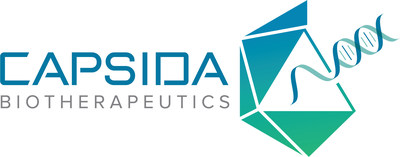CAP-003 achieved best-in-class GCase increases
in NHPs exceeding levels needed for normalizing activity in
patients
Brainwide RNA expression greater than 200-fold
higher than AAV9, with significant detargeting of liver and DRGs
with proprietary engineered capsid
Company on track to file IND in first half of
2025
THOUSAND
OAKS, Calif., Oct. 7, 2024
/PRNewswire/ -- Capsida Biotherapeutics ("Capsida") presented new
IND-enabling data on its intravenously (IV) delivered gene therapy
for Parkinson's disease associated with GBA mutations (PD-GBA),
CAP-003, that demonstrate its substantial therapeutic potential.
Capsida's next-generation therapy, using a proprietary engineered
capsid, demonstrates best-in-class potential to effectively and
safely treat PD-GBA. CAP-003 achieves unprecedented levels of GCase
protein and activity while simultaneously detargeting the liver and
dorsal root ganglion (DRGs). These data were presented in a
late-breaking poster presentation at the Society for Neuroscience
"Neuroscience 2024" annual meeting being held October 5-9, 2024 in Chicago, IL.

Mutations in GBA, the gene expressing the GCase enzyme, affect
up to 15% of PD patients and are the most common genetic risk
factor for PD. Post-mortem studies demonstrate an approximate 30%
GCase activity deficit in patients1. Other
potential treatments for PD-GBA have been limited by their
inability to cross the blood-brain barrier and supplement GCase
enzyme activity in sufficient quantities to overcome the deficit in
patients and impact the disease. In an attempt to overcome these
challenges, they have utilized invasive direct brain or
cerebrospinal fluid administration, with limited results, but
significant burden for patients.
Results from Capsida's IND-enabling non-human primate (NHP)
studies show brainwide RNA expression more than 200-fold greater
than IV administered AAV9 and substantial increases in GCase
protein and enzyme activity compared to untreated animals. A single
IV infusion of CAP-003 resulted in up to six-fold increase in GCase
protein compared to untreated animals in relevant brain regions.
Across doses and brain regions, including the substantia
nigra, the levels of GCase activity following infusion of CAP-003
was increased by up to approximately 250% compared to untreated
animals. These data support the potential for meaningful clinical
benefit in patients. Increases of 30% are expected to normalize
GCase activity in patients with PD-GBA. NHPs dosed with CAP-003 IV
have 19- and 17-fold less biodistribution to the liver and DRG,
respectively, compared to IV administered wild-type AAV9. CAP-003
is well tolerated with no notable safety findings in NHPs.
"Capsida's wholly owned novel gene therapy offers the potential
to normalize GCase activity in patients with a single IV infusion
safely, enabling the potential for long-term disease modification
and substantial slowing of disease progression," said Peter Anastasiou, Capsida's Chief Executive
Officer. "These data give us confidence that we are on track to
enter the clinic with CAP-003 in the first half of 2025."
Capsida to Present at Cell & Gene Meeting on the
Mesa
In addition, Capsida will present these data as part of
a corporate presentation at the Cell & Gene Meeting on the Mesa
taking place October 7-9, 2024, in
Phoenix, AZ. Mr. Anastasiou will
present a corporate update on Tuesday,
October 8, 2024 at 3:45 PM
local time.
The Capsida corporate presentation can be accessed by visiting
the News section of the Company's website
at www.capsida.com.
About Capsida Biotherapeutics
Capsida Biotherapeutics
is a fully integrated gene therapy company with a central nervous
system (CNS) pipeline consisting of disease modifying and
potentially curative treatments for rare and more common diseases
across all ages. Capsida's intravenously (IV) administered gene
therapies utilize proprietary engineered capsids that enable high
transduction levels to desired tissues and cells, while limiting
tropism to non-target organs, such as the liver. Capsida has three
wholly owned programs, including potential best-in-class treatments
for genetic epilepsy due to STXBP1 mutations and Parkinson's
disease associated with GBA mutations, both of which are in
IND-enabling studies and on track to enter the clinic in the first
half of 2025. In addition to its wholly owned programs, the Company
has validating CNS partnerships with AbbVie, Lilly, CRISPR
Therapeutics, and the AbbVie partnership was expanded to include
ophthalmology disorders. Capsida was founded in 2019 by lead
investors Versant Ventures and Westlake Village BioPartners and
originated from groundbreaking research in the laboratory of
Viviana Gradinaru, Ph.D., a
neuroscience professor at Caltech. Visit us
at www.capsida.com.
1Gegg, M. E, et al (2012). Annals of neurology,
72(3), 455-463.
 View original content to download
multimedia:https://www.prnewswire.com/news-releases/new-data-demonstrate-substantial-therapeutic-potential-of-capsidas-iv-gene-therapy-for-parkinsons-disease-associated-with-gba-mutations-302267777.html
View original content to download
multimedia:https://www.prnewswire.com/news-releases/new-data-demonstrate-substantial-therapeutic-potential-of-capsidas-iv-gene-therapy-for-parkinsons-disease-associated-with-gba-mutations-302267777.html
SOURCE Capsida Biotherapeutics